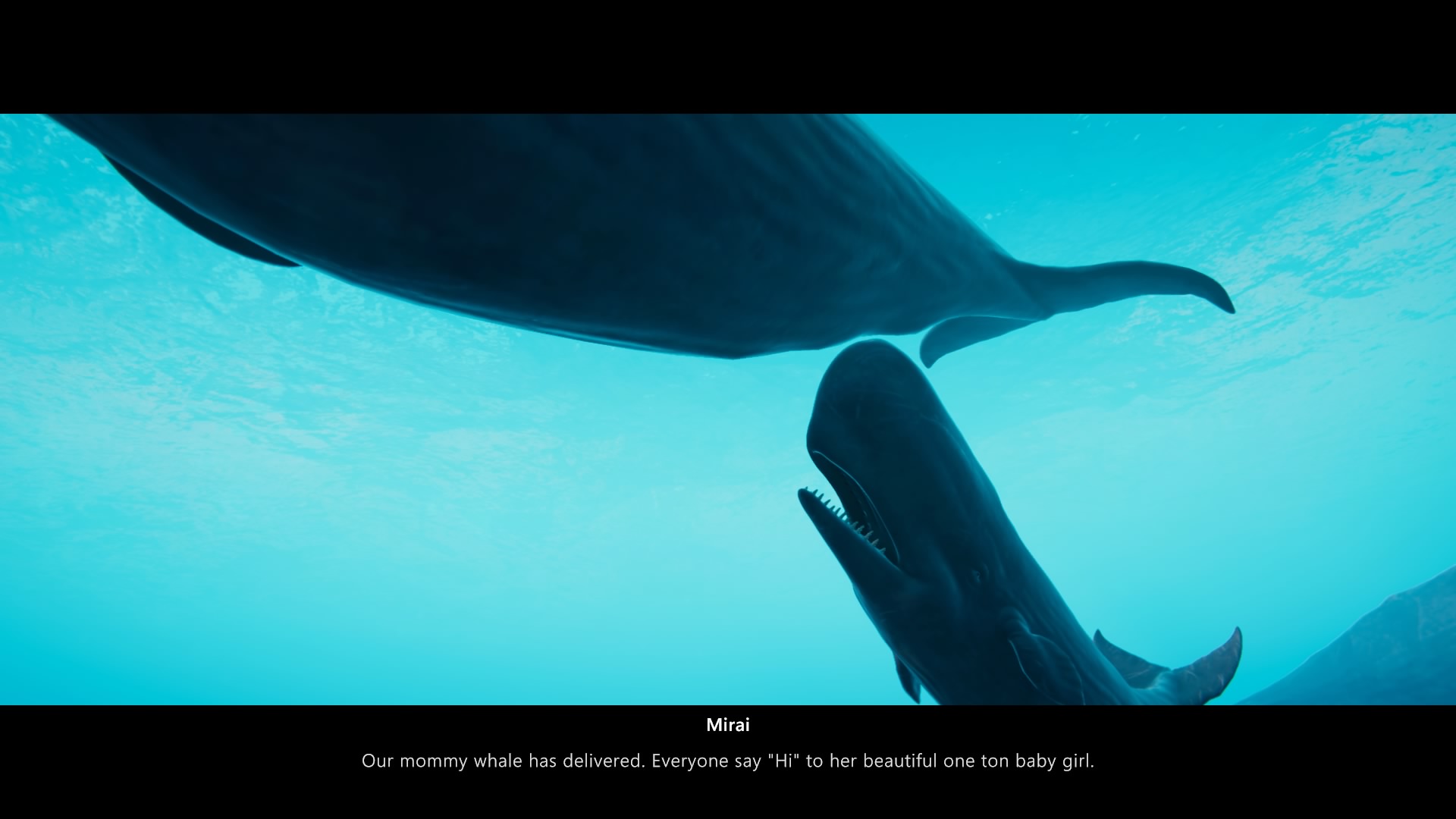Platforms:
Xbox One, PS4, PC
Released:
June 11, 2020
Publisher:
E-Line Media
Developer:
E-Line Media
I should not have liked Beyond Blue. For one, science isn’t my thing. I literally nearly failed science in high school. Me, an artsy book worm, didn’t love the whole practical element of science classes. Also, I mainly play RPGs or looter shooters, not slow paced narrative adventures. Therefore, it may surprise you, as it did me, that Beyond Blue is now my favourite of all the games I’ve reviewed this year for Checkpoint. If I’d played this back when I was 16, science would have been much more appealing.
The main reason why this game was successful for me is that it follows a mantra I have as a teacher. Education and learning new things should not be boring. E-Line Media, the publisher and developer of Beyond Blue, have a history of making creative games based on exploration. They published Never Alone in 2014; a game that was developed by Upper One Games, the first indigenous-owned game developer/publisher in the US. Never Alone was also the first video game to tell the story from an Indigenous person’s perspective. Set in North Alaska, it is all about exploring the landscape and restoring balance to nature.
Now E-Line have swapped the freezing snow for the freezing deeps of the ocean. The setting is made even more spectacular due to E-Line’s collaboration with BBC’s Blue Planet II. The game includes footage from and was inspired by the documentary series.
You play as deep-diver and scientist Mirai, a young woman who is passionate about her job but also has a lot of issues on the home front. Along for the ride are André and Irina, two scientists who don’t really see eye-to-eye. André wears his heart on his sleeve, is extremely passionate about turtles and and conserving the ocean. Irina is more focused on what the miracles of the ocean can do in regards to advancing medicine to help mankind.
Mirai’s job is to find the buoys placed in the ocean and track the sounds of sea creatures around her. Once she has picked up the sound, markers are set and you swim up to these and scan the creatures to expand on the research of your team. The gameplay is super easy, which has obviously been a decision made by E-Line so that younger players won’t have an issue. I can see my five year old niece easily getting a hang of scanning and floating around the ocean. I can also see her being amazed by the gigantic and colourful creatures that traverse around you. Sharks, turtles and octopus, among many others, are all there for you to scan and swim with.
Whilst you are on your dive, André and Irina have a watchful eye on you via a live stream feed. Their conversations with Mirai are bubbly and break up some of the monotony of your dive. They also hold further insight into who these other scientists are and where their passion for the ocean lies.
The narrative under the sea focuses on a family of whales and Mirai’s connection to them. The team work on mimicking the sounds whales make to strengthen their connection and also learn more about the ways they communicate. There are some tragedies and man made disasters within the storyline, but I won’t spoil them for you. What I can say is that I didn’t feel that Beyond Blue ever pushed an agenda down my throat, just as it didn’t push education.
Instead, it opened up a gorgeous underwater world and conversations between extremely knowledgeable and impassioned characters. E-Line Media worked with real life scientists to present accurate information throughout the game. By focusing on developing the scientific knowledge through exploration, conversation and narrative, E-Line made me thirsty for more information about the mystery of the ocean. The developers seem to be adhering by the James Cameron quote, “Curiosity is the most powerful thing you own.”

In-between dives Mirai spends her time in her submarine. From here you are prompted to call André and Irina to discuss discoveries post dive. These interactions, like the conversations during the dives, were intriguing as they showed the different emotional reactions each character had about the information garnered from the dive.
You can also talk to Mirai’s sister, Ren, who is caring for their grandmother who is suffering from Alzheimer’s. Their grandmother is important to both Mirai and Ren as she raised them after the death of their parents. She was also a diver and stoked Mirai’s passion for diving and the ocean. These conversations with Ren are tense and hint at old scars. You can hear the frustration in Ren’s voice when Mirai brings up school and I had a feeling Ren was walking in the shadow of her big sister’s footsteps. I looked forward to time spent in the sub so that I could continue these conversations with Ren and slowly piecing together their relationship. I would have liked for the narrative to dive a little deeper into this, as a lot was left unanswered.
“By focusing on developing the scientific knowledge through exploration, conversation and narrative, E-Line made me thirsty for more information about the mystery of the ocean.”
Inside the sub you can also find a digital collection of creatures that you have scanned and further information about them. It also provides videos that expand on the concepts discussed during each dive. These videos include interviews with lead scientists and footage from Blue Planet II. As I said before, Beyond Blue doesn’t push education down the player’s throats, but if they want to become more informed, the information is readily available for them to explore.
There are also random objects scattered around the sub, such as books of poetry and a gorgeous child’s drawing of Mirai, her sister and grandmother. These objects were not discussed however and it would have been a great opportunity for the devs to bring in a bit more character development.
A media player is also in the sub that plays laid back tunes. It introduced me to new tracks that I’ve now added to my own personal playlists, such “Suzi Noma” by Muthoni Drummer Queen. Other artists that fill the sub’s playlist are The Flaming Lips, Miles Davis and The Edisons. You can let the game shuffle through, or pick a tune that fits your mood.
These songs mix with the atmosphere of the game beautifully – charming, calming, thought provoking and serene. A game that makes learning about the ocean a mystery that is beautiful to explore and uncover.
8
Great
Positive:
- The beauty of the ocean really comes to life.
- The narrative both below and above the sea are impactful.
- Gameplay is straightforward and easy to master.
- The extra content is well produced and expands on base game information.
- Doesn't push the whole "educational" element down the player's throat.
Negative:
- Quite a short game.
- Sometimes I wanted more information about the creatures being scanned.
- Some opportunities for further narrative exploration were not taken.
Though 16 year old me missed out on the opportunity to see how creative science can be, hopefully Beyond Blue will entice young people to see science as a field brimming with opportunities for creativity and exploration.
Even though Mirai is a strong, female protagonist with an amazing job, she is also someone who is relatable. This comes down to the feelings of grief she is experiencing due to the loss of connection to her grandmother. E-Line didn’t create a “perfect” person here, but one who has struggles even though she has landed her dream job. Therefore, by playing this game, the idea of being a scientist may be more approachable to the younger generation, especially women who sometimes aren’t encouraged to see science as a career option.
Beyond Blue handles educational material successfully. It makes its ideas easy to digest, approachable and most of all, fun. Its mixture of gorgeous graphics, realistic narratives and insight into the world of the characters and their interactions with the ocean, makes this a game that won over this RPG devotee who used to wag science class.





